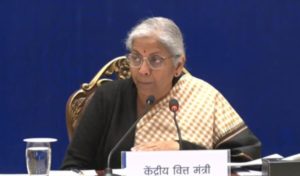Former Chief Economic Advisor Arvind Subramanian questions GDP figures of which he too was a part

Arvind Subramanian (File/IANS)
Arvind Subramanian (File/IANS)
New Delhi: India’s former chief economic advisor Arvind Subramanian on Tuesday questioned the country’s GDP figures of the time period during which he was part of the government for some years. From 2015 to 2018, Subramanian presented four economic surveys, and not even once did he raise the same issue.
The overall GDP growth for 2017-18, stood at 6.7 per cent, according to the government data. it is in the last quarter of this fiscal that India surpassed the grwoth of China. The Indian economy had posted the GDP growth of 7.1 per cent for the previous financial year 2016-17. In 2015-16, India’s growth at 7.6%, the fastest in five years and the previous fiscal in 2014-15, the economy had posted a growth rate of 7.2 per cent.
During all these years, Arvind Subramanian defended, supported and took pride in these GDP numbers alongside Finance Minister Arun Jaitley each time and there was not a single word on the methods, numbers or the reasons behind such figures.
Subramanaian abruptley ended his tenure to return to teaching, citing personal reasons in June 2018. He had taken charge as the CEA on October 16, 2014 for a period of three years. In 2017, his term was extended for a year.
On June 12, 2019, the ex-CEA said India’s GDP growth overestimated in 2011-12 & 2016-17 and asserted there is a possibility of substantial over-estimation in the growth figures while stating the actual GDP growth between 2011-12 and 2016-17 was 4.5% as against 7%.
Former Chief Economic Advisor Arvind Subramanian in a research paper has questioned the government’s official GDP growth figures, saying that the country may have grown at an average 4.5 per cent in the years between 2011-12 and 2016-17, instead of about the 7 per cent average as shown by official data.
In 2014-15, the GDP growth pertains to both the UPA-II and NDA-I regimes.
In the paper, Subramanian, who quit as the CEA in June last year, used 17 “real” indicators such as vehicle sales, industrial production, credit growth and exports and imports, to check for their correlation with GDP figures during the years 2001 and 2017.
In 2016-17, when two major structural reforms were introduced — GST and demonetisation — in the Economic Survey, he stated: “Against the backdrop of robust macro-economic stability, the year was marked by two major domestic policy developments, the passage of the Constitutional amendment, paving the way for implementing the transformational Goods and Services Tax (GST), and the action to demonetise the two highest denomination notes.
On demontisation, he had stated: “The aim of the action was fourfold: to curb corruption; counterfeiting; the use of high denomination notes for terrorist activities; and especially the accumulation of “black money”, generated by income that has not been declared to the tax authorities”.
On November 30 2018, the Ex-CEA in his book, ‘Of Counsel’ said demonetisation was draconian. The sharp negative adjective was a contrast to what he had said when he was CEA. “Demonetisation has been a radical, unprecedented step with short-term costs and longterm benefits. The liquidity squeeze was less severe than suggested by the headlines,” he had said in the 2016-17 Economic Survey.
Published on: June 11, 2019 at 22:07 IST
IANS




